Other religious articles on this site:
.
.
.
.
.
.
.
.
.
.
.
If you have a suggestion or religious article to submit, send it to:
Editor/viewzone.com
myristicin@hotmail.com

Imagine you're watching a good movie on your television. The lights are dim and your attention is focused on the actors on the screen. You know that this is the face of Brad Pitt or Meryl Streep. You know they are actors. But you allow yourself to become personally involved with the drama and forget the context in which you are the observer. For the moment, the characters are real and important. You are in the dream. Buddhists and Hindus, as well as many other sects, believe that we live our lives in a dream. Instead of characters in a movie, we ourselves are the actors in the drama that is our everyday reality. Many esoteric faiths, especially Buddhism, attempt to wake us from this dream and remind us who we really are. They aim to show us the real context of all that is "out there" in the external world so that we can, once again, regain our true identity as the observer. The awakening from this dream is called "enlightenment." 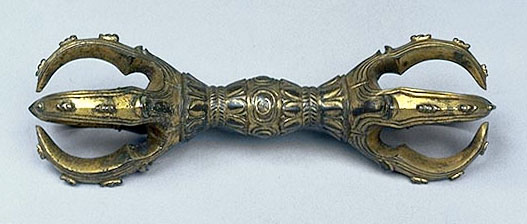 [Above: A Tibetan Dorje.]
The Bell and Dorje, or thunderbolt, are inseparable ritual objects in Tibetan Buddhism. They are always used in combination during religious ceremonies. The Bell held in the left hand, representing the female aspect as wisdom; the Dorje, or male held in the right hand, aspect as method. Together, they represent union of wisdom and method, or the attainment of "enlightenment." The transformative enlightenment experience is recounted in the various religions. In the Christian tradition, the conversion of Saul of Tarsus is a well known example. He is reported to have been "Struck by light," after which he understood his purpose in life.
"About noon as I came near Damascus, suddenly a bright light from heaven flashed around me. I fell to the ground and heard a voice say to me, 'Saul! Saul! Why do you persecute me?' " `Who are you, Lord?' I asked. "`I am Jesus of Nazareth, whom you are persecuting,' he replied. My companions saw the light, but they did not understand the voice of him who was speaking to me. " `What shall I do, Lord?' I asked. " `Get up,' the Lord said, `and go into Damascus. There you will be told all that you have been assigned to do.' My companions led me by the hand into Damascus, because the brilliance of the light had blinded me" (Acts 22:6-11).
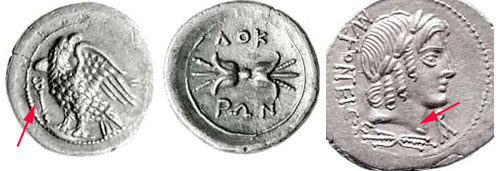 [Above: Coins from the early Christian era.] Christians also use the phrase "to be born again." This really has origins in the new reality that comes when a person awakens and realizes that he or she is part of God's creation, sharing in divine love, and can leave the old life of materialism. Like Saul, this realization or awakening often comes suddenly and is perceived as a bright light, or lightening bolt.
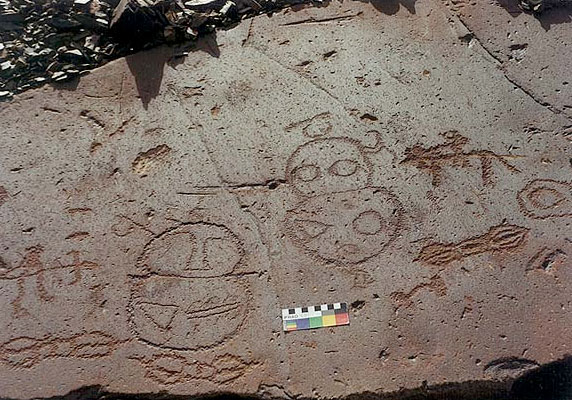 [Above: Ancient petroglyphs in Asia attest to the importance of this symbol.] For Buddhists, it is what occurred to the historical Buddha and to all those who experience kensho-satori, the dropping away of 'self'. The Tibetans call this "the Great Death" to distinguish it from that physical one which will be the experience of us all.
A dorje, then is like the diamond, but that gem is an inadequate symbol for it. However, just as any other substance will be destroyed on impact with a diamond, so the ritual object symbolizes that which is indestructible, enduring, powerful, invincible, and irresistible. Like a diamond, all inferior truth and beliefs will be shattered when confronted with the ultimate truth that we are the "observer," and that everything else is just illusion. Vajra is a Sanskrit equivalent of the Tibetan word dorje and it carries many meanings: Indra's thunderbolt, the lamas' sceptre, and diamond, but only in the sense mentioned above. It may also be used as a qualifying term for anything used in the tantric context. Thus the person who presides at tantric rituals is called the vajra master or dorje lopon. Ju-i is the Chinese, and Nyo-i, the Japanese, word used for the thunderbolt.
 [Above: Japanese version of Nyo-i, or dorje.] One becomes curious why this symbol appears throughout antiquity and in such different cultures, both Pagan, Christian and Buddhist. Perhaps it is because all cultures and religions share a common quest: overcoming the often harsh reality that we will all die. It is believed that one aspect of consciousness separates humans from all other thinking animals and that is the conscious understanding that we are alive. This consciousness is a two sided gift of our evolution, for it also means that we must face our own inevitable mortality. The joy of material ownership, financial and social achievements, of cherished experiences and relationships... all of this is made moot when we project our future beyond a human lifetime. Many religions attempt to create belief in an afterlife of material bliss, still putting value in the material things of the living and the pleasures of the mortal body. But "enlightenment" offers an escape from this by reminding us that we are not our bodies and we are not to be judged by our possessions or experiences. These, too, belong to the transient "dream," the "soap opera" that we have been watching. What is our REAL nature? Those who have found this through enlightenment often find it difficult to express in words, since words represent things of this dream world. Some have used terms like "Oneness" to describe the understanding that we are all somehow connected. Others have said that we are pure love. It is possible that, through meditation, a person can get a glimpse of enlightenment which is fleeting and passes, leaving only a fading memory that quickly becomes coaxed back to sleep in the dream that is our normal reality. St. John of the Cross had this experience and continued to write prolific prose about his sadness at not being able to find it again.
Ah - Who can cure me?
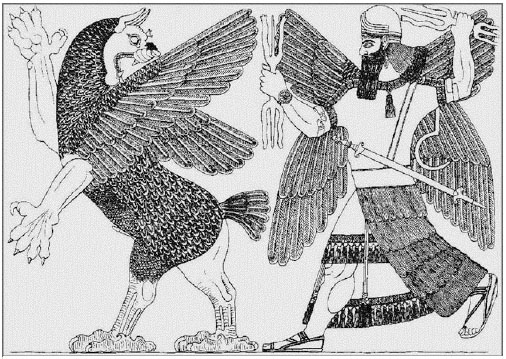 To use a modern analogy, our own death is the 800 pound gorilla in the room with which we never make eye contact. Death holds potential terror and invalidates almost everything we hold important in our transient lives. The paradox seems to be that Enlightenment, the death of our ego, is the only path to eternal life.
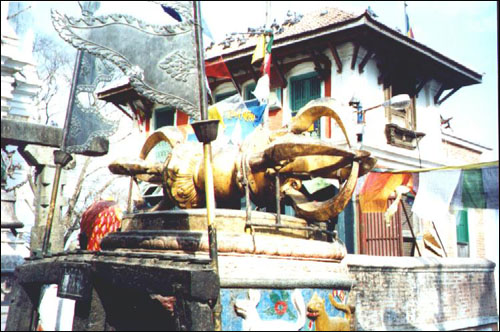 The giant dorje of Swayambhunath, Nepal that is associated with Karmapa Rangjung Dorje.
This was interesting. I used to believe that Jesus was the only way to get to heaven but then I thought one day about heaven. Many people believe it's a place with beauty and good food and clouds - like the movies. But when we're dead we have no body so what good is all that? If there is a heaven then it must be good in some other ways and that means we must be something else besides our bodies. Even our thoughts and ideas are about things to do with our bodies and our senses. Maybe our memories don't even survive in heaven! The whole idea about a heaven and some kind of reward for being good is wrong, I think. It's the thing we are taught as kids, getting a candy for being good. Maybe it's just the way we are supposed to be anyway so there's no reward needed. Anyway, that's just my idea. Karen OK. So "enlightenment" comes very quickly like a flash of lightening and a thunderbolt. But then sometimes it doesn't stay? I am curious how that can be. Baxter In regard to Comments on the Dorje article I noticed the person questioning - "So "enlightenment" comes very quickly like a flash of lightening and a thunderbolt. But then sometimes it doesn't stay? I am curious how that can be.?" And thought this passage from Victor Sanchez might explain that quite well.. You do not become perfect. You are going to be full of shit in many ways. But the difference here is that the part which is going to be winning and ruling your life is that part which has been liberated by the experience of the other self. That's when you start to live your own life. That's when you start to choose your own battles. That's when you discover that whatever is happening to you, you are the one who has gone there and you are the one who can change it. That's when you live your own battles. It's a big difference. People ask me the same question. "After the workshop, I had an incredible open vision about my fate, my tasks, about really living as a warrior, but then, little by little that sensation faded and I felt sad because I promised myself to not forget, but then I am in my old problems again." What is going to happen to us if we are really committed to following the path of the warrior is that we are going to touch the light, and then we're going to forget. And then we're going to try again. And then we are going to get to the place of awareness again. We are going to get there, and then we're going to be out, and that's the way it happens because that's the magic of life. Hoyt Vandenberg
|

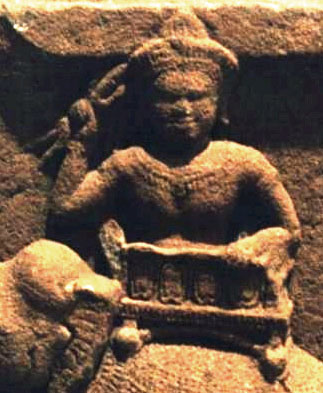 Symbolically a dorje represents the 'thunderbolt of enlightenment,' that abrupt change in human consciousness which is recognised by all the great religions as a pivotal episode in the lives of mystics and saints. Once "enlightened," the observer can detach from the personal importance of money, romance, food and even life itself. Happiness then comes from inside -- not outside -- of the observer who recognizes that he (or she) is part of the Creation.
Symbolically a dorje represents the 'thunderbolt of enlightenment,' that abrupt change in human consciousness which is recognised by all the great religions as a pivotal episode in the lives of mystics and saints. Once "enlightened," the observer can detach from the personal importance of money, romance, food and even life itself. Happiness then comes from inside -- not outside -- of the observer who recognizes that he (or she) is part of the Creation.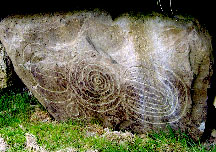 [Right: Petroglyphs of the British Isles suggest this same shape.] Dorje is the Tibetan word for vajra. Do-rje means noble stone > Do = stone and rJe = noble or prince. It embodies not only the brilliance of refracted or reflected illumination, but it also symbolizes the impervious and fixed solidity of the point of power around which all else turns -- the axis mundi or hub of the world.
[Right: Petroglyphs of the British Isles suggest this same shape.] Dorje is the Tibetan word for vajra. Do-rje means noble stone > Do = stone and rJe = noble or prince. It embodies not only the brilliance of refracted or reflected illumination, but it also symbolizes the impervious and fixed solidity of the point of power around which all else turns -- the axis mundi or hub of the world.